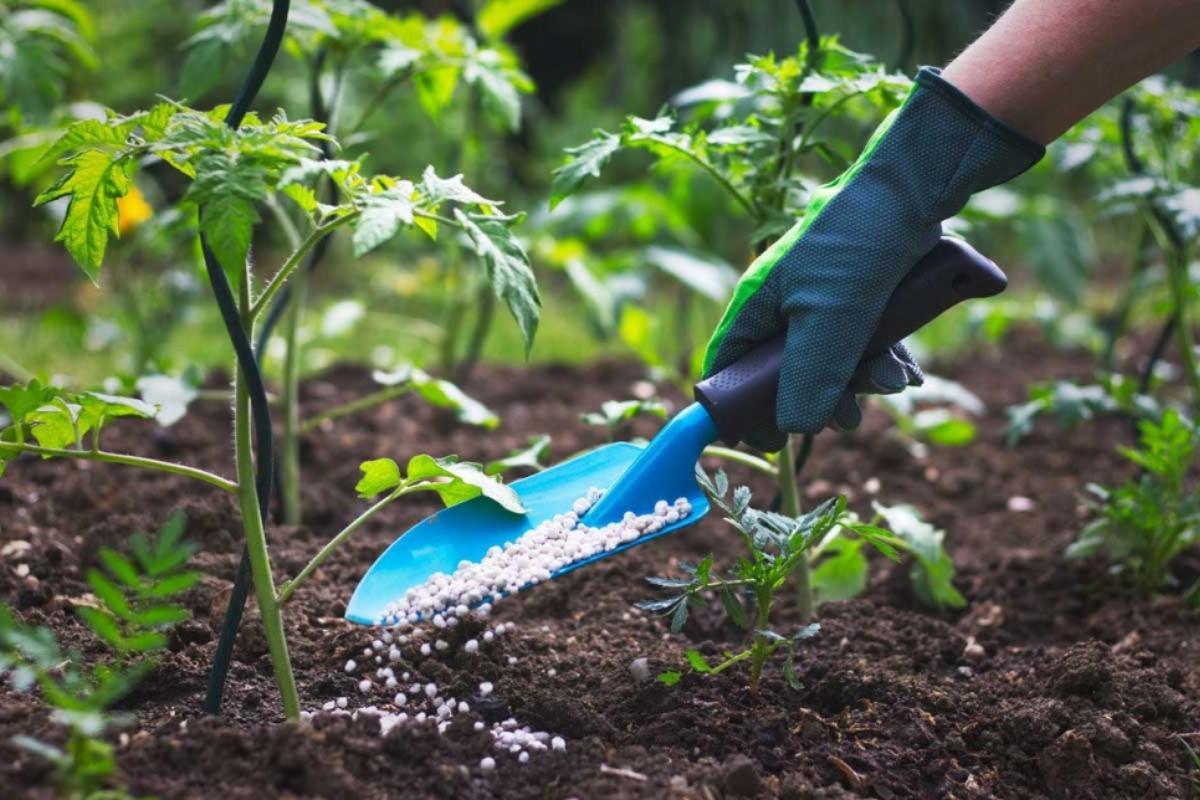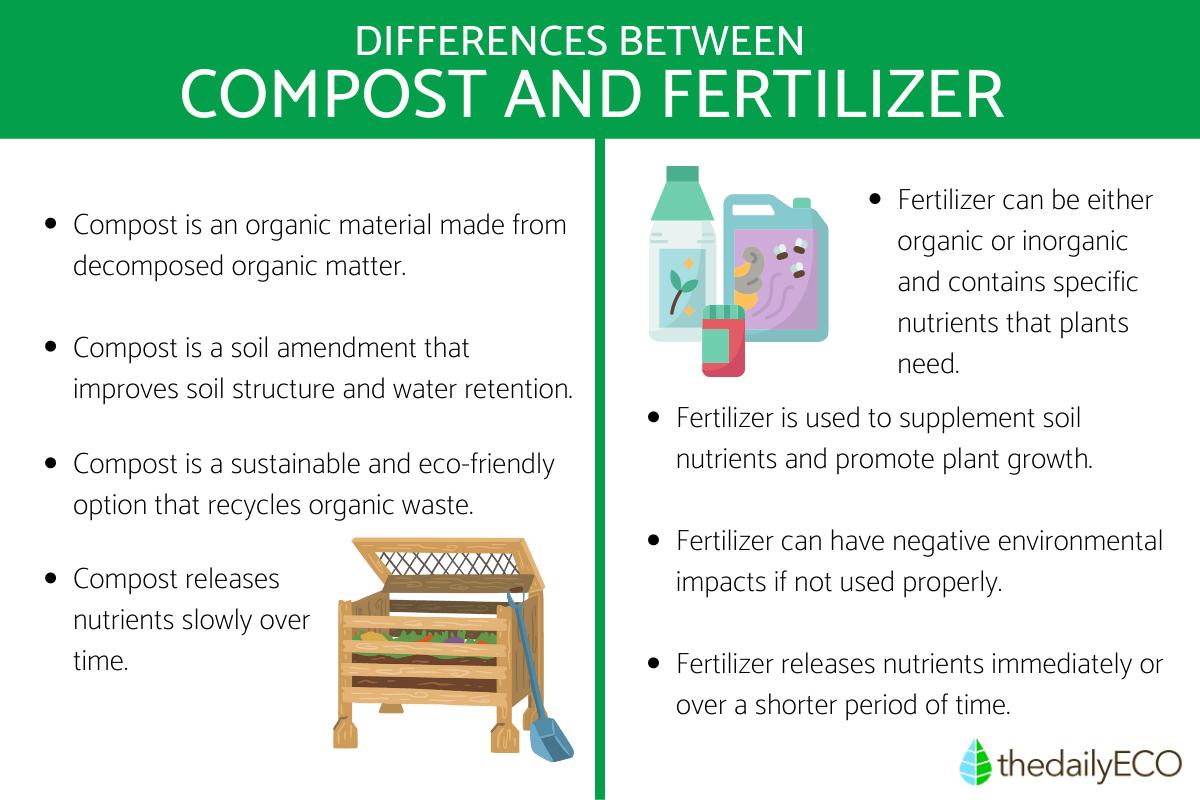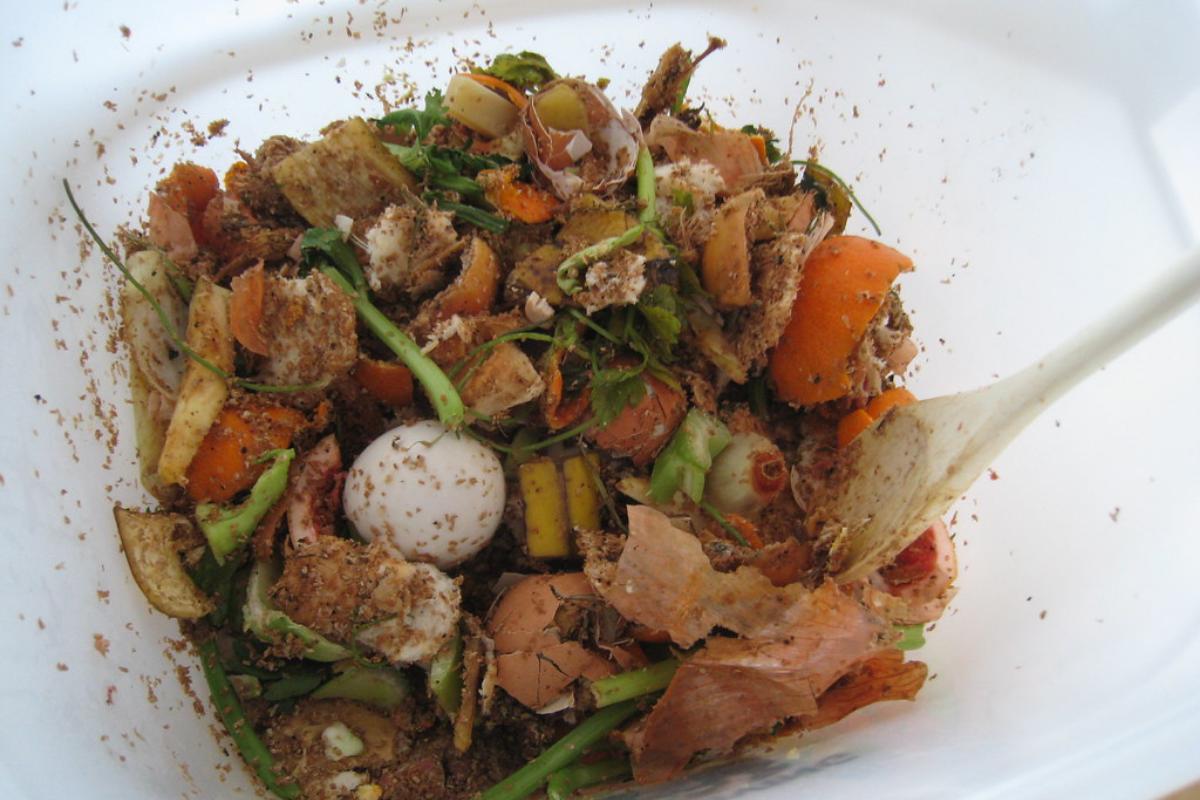Differences Between Compost and Fertilizer


Composting and fertilizing are two of the most popular methods to improve soil quality and promote plant growth. Both techniques involve the use of organic material, but differ in how they are produced and applied. Although compost and fertilizer are often used interchangeably, they are not the same thing. Understanding the difference between compost and fertilizer is critical for gardeners, farmers, and anyone who wants to improve soil quality and grow healthy plants.
This article from thedailyECO looks at the key differences between compost and fertilizer, and their types.
What are the differences between compost and fertilizer?
There is a common misconception that compost adds nutrients to the soil, while fertilizer only benefits plants. However, upon closer inspection, this distinction is not entirely accurate. The actual differences between compost and fertilizer lie in their composition and application.
Compost is a natural product made by decomposing organic material, such as food scraps, leaves, and yard waste. It enriches nutrients in the soil and benefits plants. Moreover, it can be created at home with little to no cost, using readily available materials. Composting is an eco-friendly process that helps reduce waste and improve soil quality.
Fertilizers, in contrast, are human-made products consisting of macronutrients. Most fertilizers used today are chemically derived and can be harmful to the environment if not used correctly. They can seep into water sources and cause pollution. Furthermore, fertilizers, especially organic ones, can be costly to purchase.
Compost provides a more comprehensive range of nutrients and micronutrients than fertilizers, which typically contain only macronutrients. Compost releases nutrients slowly over time as it decomposes, providing a gradual and long-term source of nutrients for plants. In contrast, fertilizers provide an immediate source of nutrients. Compost promotes long-term soil health and plant growth, while fertilizers provide short-term benefits that require frequent application.
In terms of application, compost is commonly used as a soil amendment and is often spread or mixed into the soil to improve soil health, structure, and fertility. Fertilizers, on the other hand, are usually added to the soil to provide essential nutrients for plants to grow. They can be applied to the soil surface or incorporated into the soil through tillage. Fertilizers can come in different forms such as granular, liquid, or slow-release.

What types of fertilizer are there?
As mentioned before, compost is a type of organic material made from decomposed plant and animal matter. There are several types of compost, each with its own unique properties and uses. Some common types of compost are:
Compost made from garden waste
This is made from leaves, grass clippings and other garden waste. It is usually high in carbon and low in nitrogen, making it a good soil conditioner for plants that prefer a slightly acidic environment.
Kitchen Waste Compost
This compost is made from food scraps and other organic kitchen waste. It usually contains a lot of nitrogen and can be used as a soil conditioner for plants that need more nitrogen.
Manure compost
It is made from animal manure, such as cow or horse manure. It is a rich source of nitrogen and other nutrients and is ideal for adding to the soil in the fall or spring.
Green compost
It is made from freshly cut grass, garden weeds and other green plant material.
Mushroom compost
It is made from substrate for growing mushrooms that has been sterilized and then allowed to decompose. It is a good soil additive for plants that prefer a slightly acidic environment.
Worm compost
It is made from worm droppings and is also called vermicompost. It contains many nutrients and is ideal for adding to the soil in the fall or spring.
These are just a few examples of the different types of compost available. The type of compost you choose depends on the needs of your plants and the materials you have available for composting. You may be interested in this other article, where we explain how to make your own worm cast at home.

What types of fertilizers are there?
There are several types of fertilizers that can be classified based on their composition, origin, and method of application. Here are some of the most common types of fertilizers:
Organic fertilizers
They are made from natural materials such as animal manure, compost and bone meal. They are usually slow-release fertilizers, meaning they release nutrients over time as they break down. They are an environmentally friendly alternative to chemical fertilizers.
Inorganic fertilizers
These are chemical-based fertilizers that contain synthetic compounds such as nitrogen, phosphorus and potassium. They are fast-release, meaning they provide nutrients to plants immediately. When used excessively, they can harm the environment by contaminating soil and water sources.
Liquid fertilizers
These are fertilizers in liquid form that can be easily applied to plants. They can be organic or inorganic and are often used for foliar fertilization or to supplement soil fertilizers.
Slow-release fertilizers
These are fertilizers that release nutrients over a longer period of time, usually several months. They can be organic or inorganic and are ideal for plants that require a steady supply of nutrients over a long period of time.
Controlled-release fertilizers
These are fertilizers that release nutrients slowly and evenly over an extended period of time, usually up to a year. They are commonly used in commercial agriculture and landscaping.
Specialty Fertilizers
These are fertilizers designed for specific crops or soil conditions. For example, an acidic soil requires a fertilizer with a high pH, while plants that need high iron or magnesium levels benefit from specialty fertilizers containing these elements.
Do not miss this other article where we present the 10 best homemade organic fertilizers for the garden.
If you want to read similar articles to Differences Between Compost and Fertilizer, we recommend you visit our Gardening category.







